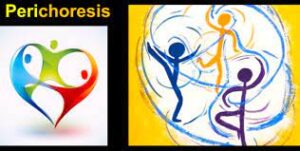
Arquivo para June, 2023
Idealism and perichoresis
Idealism, by developing the categories in-itself, of-itself and for-itself, isolates the trinitarian possibility of relationship and annuls the idea of ontological relationship, what is in-itself if it is not Being and what is for-itself if it is not is non-Being, the Other is not the negation of Being, but its complement.
trinitarian possibility of relationship and annuls the idea of ontological relationship, what is in-itself if it is not Being and what is for-itself if it is not is non-Being, the Other is not the negation of Being, but its complement.
Self is relationship, and this completes the Christian Trinitarian idea of three persons in relationship, which is called perichoresis.
In a possible metaphor with Idealism: God-Father is God-in-itself, God-son is God-for-itself and God-Holy Spirit is God-in-itself, it is observed that God-for-itself is both man ( God transcendent his divinity) as he is Divine (Jesus is God and transcends humanity)
This means the one in three persons, the first Christian council of Nicaea (325) discussed the divinity of Jesus, because it was even easier, due to the dualism of Being and non-Being, to believe in two than in three.
To support the dualistic idea, some pseudo-theologians have used the idea that God the Father is the source and origin of all divinity, so the other two people were generated by the Father, creating a new way of denying the Trinitarian perichoresis, or if you prefer “ the dance” in the inner divine relationship.
It was the Cappadocian priests, Gregório Magno, Gregório de Nyssa and Basilio de Nyssa, who saw this contradiction, which comes dressed in a new guise, with the exchange of the word prosopon (persona) for hypostasis, which in turn is confused with ousía.
Basilio used the formula of Mt 28,19 which states that the communication of the Three in baptism manifests the Holy Spirit in the union of the Father with the son, in the same dignity, and manifests it to man in baptism, for this reason valid baptism is in the name of the Three People.
The relationship is like a dance between the three people with the metaphor of the Cappadocians.
This relationship is mystical, but it is concretely described in John 3:17: “In fact, God did not send his Son into the world to condemn the world, but that the world might be saved through him”.
God the image of man
It was Feuerbach who was the first to make an anthropological reduction of theology, his god is made to establish man, there is no liberation of man without the negation of god. He started from the assumption that religion is the expression and cause of human alienation, he saw it like this: “man’s knowledge of God is only man’s self-knowledge and his own essence”, in a clear allusion to Hegel’s Absolute.
of theology, his god is made to establish man, there is no liberation of man without the negation of god. He started from the assumption that religion is the expression and cause of human alienation, he saw it like this: “man’s knowledge of God is only man’s self-knowledge and his own essence”, in a clear allusion to Hegel’s Absolute.
His analysis of the religious attitude and the concept of alienation, Feuerbach influenced the socialist thinkers of the 19th century, especially Karl Marx, is among others (called Old Hegelians) a transition between Hegelian idealism and historical materialism.
Its analysis is important because many today reaffirm this idea that it is the material basis that constitutes man’s consciousness, the consciousness of God is the consciousness that man has of himself, the knowledge of God is the knowledge that man has of himself even so god of prosperity and who gives human material goods is Feuerbach’s god.
This is also present in contemporary religions, a god of power and wealth.
We have already elaborated that Hegel’s god of the Absolute is not relation and therefore not Trinitarian.
His reading is: ““the hermeneutic key that the author uses to understand religion is the following: religion is anthropology, ‘theology is anthropology’, so what man says about God, through religious language, is nothing else. than a confession of his aspirations and projects”, however it is God who creates to satisfy only immediate human needs.
This does not mean a God in nature who does not know man, otherwise the figure of Jesus would just be a superior being with no relation to man, including his human needs.
The Hegelian world created this selfish and merely human face, where gifts and divine asceticism do not exist.
Feuerbach, Ludwig (1988) A essência do cristianismo. Brazil, Campinas: Papirus, 1988.

